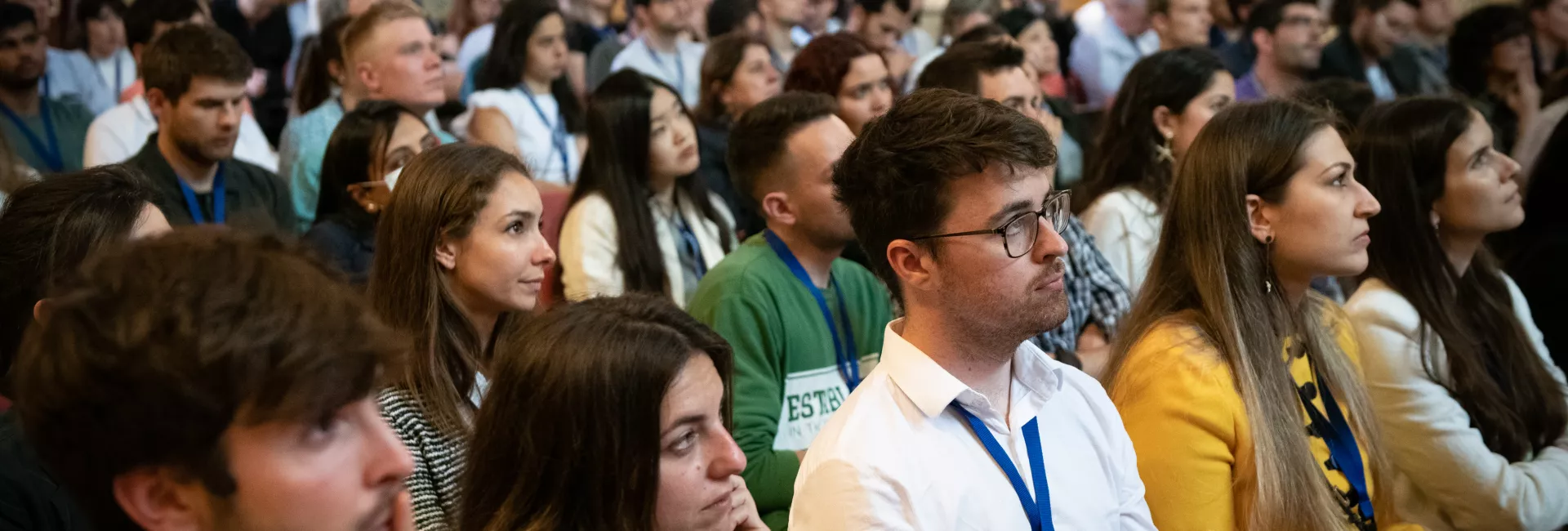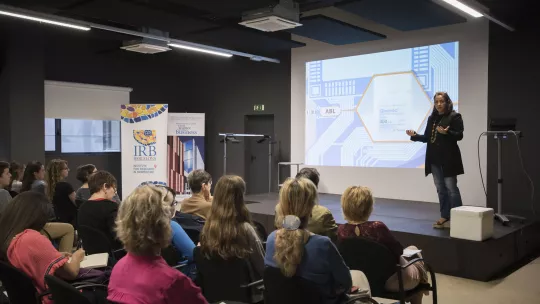Presentation
Organizer: IRB BioMed Seminars
Date: Monday 24 October, 12:00h
Place: Felix Serratosa Hall, PCB
Speaker: Elsa Quintana, Pharm.D., Ph.D. Senior Director Cancer Immunology, Revolution Medicines, Redwood City, USA
Title: "Enhancement of anti-tumor immunity in RAS-addicted cancers with tri-complex RAS(ON) inhibitors"
Host: Eduard Batlle, PhD
Abstract:
RAS mutations (RASMUT), the most frequent oncogenic alterations in human cancers, promote carcinogenesis through sustained cellular proliferation and also shape the tumor microenvironment to allow cancer cells to evade an anti-tumor immune response.
RAS oncoproteins may be targeted with mutant selective, tri-complex RAS(ON) inhibitors or tri-complex RASMULTI(ON) inhibitors. These inhibitors have distinct preclinical profiles and potential clinical applications. KRASG12C(ON) mutant-selective inhibitors potently inhibit the RAS pathway in KRASG12C mutant cancer cells and indirectly modulate the TME by impacting the secretion of cytokines and the expression of cancer cell surface proteins. A RASMULTI(ON) inhibitor targets not only multiple RAS mutants but also wild-type RAS, a critical signaling node both in tumors and normal immune cells. We have evaluated the effects of KRASG12C(ON) and RASMULTI(ON) inhibitors on the TME and anti-tumor immunity in murine tumor models in vivo.
Oral daily administration of either a KRASG12C(ON) inhibitor or a RASMULTI(ON) inhibitor drove complete tumor regressions and synergized with anti-PD-1 in vivo in an immune-sensitive colorectal KRASG12C mutant model. Re-challenge experiments demonstrated that both inhibitor classes induce immunological memory. RAS inhibition with mutant-selective or RASMULTI(ON) inhibitors decreased the expression of checkpoint molecules, stem cell markers and proliferation markers on KRASG12C mutant tumor cells in vitro and in vivo. Single-agent therapy induced an increase of CD8+ T-cells and dendritic cells (DCs) and a decrease in pro-tumorigenic M2 macrophages and myeloid derived suppressor cells (MDSCs) in the tumor. In tumors treated with KRASG12C(ON) inhibitors this effect on immune cell infiltration was, in part, mediated through the modulation of tumor secreted cytokines. A RASMULTI(ON) inhibitor induced a more pronounced decrease in M2 macrophages which raised the question whether, in addition to the impact on cytokine production, there was also a direct effect of RAS inhibition on macrophages. A RASMULTI(ON) inhibitor, similar to SHP2 inhibitors (Quintana, E. et al, 2020), but unlike a mutant selective RAS(ON) inhibitor, directly and selectively reduced the viability of M2, but not M1 macrophages in vitro. To interrogate if these properties can be leveraged to convert the TME of an immune-suppressive tumor we characterized the impact of RAS(ON) inhibitors in an anti-PD-1-refractory lung KRASG12C mutant model; we observed a significant conversion of the TME in favor of anti-tumor immunity in this model.
These preclinical data suggest that mutant-selective and, more profoundly, RASMULTI(ON) inhibitors promote the conversion of an immune-suppressive into an ‘immune-hot’ TME in RAS-mutant tumors.
IRB BioMed Seminars
IMPORTANT: For attendees outside the PCB community you must register at least 24h before the seminar.
In collaboration with:


